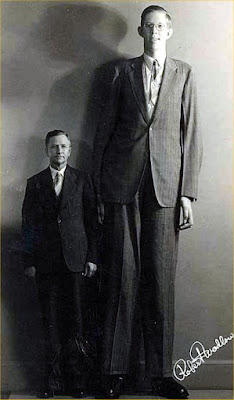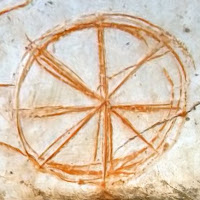Dwarfs and giants are real, by the way. Not so often today because of hormonal treatments that can control a person's growth. The photo shows Robert Wadlow (right) and his father (left). Robert reached almost nine feet in height; he was immensely strong and was still growing until his death in 1940.
 |
| Robert Wadlow |
Goliath (and several other giants in the same period) did not come to defeat individual Israelite soldiers. Goliath came to defeat the entire army and, indeed, the whole nation. He shouted defiance against Yahweh (the god of Israel) and he threatened the gathered people of Israel. I suggest that there are giants defying the Most High in our day, and threatening the church. And just as David won the entire war by defeating Goliath (1 Samuel 17:9), so will Jesus have a mighty victory when he brings down the defiant, threatening giants of our day. Let's unwrap this a bit more.
The giants - Let's think about these giants. They are very big issues that the church has developed during her long history, they mislead us and are strong and powerful, difficult to identify and shake off. The people are afraid to tackle them; these giants defy the Almighty and they cause confusion and doubt. Can we identify any of these giants? I have some preliminary ideas that I will share, but there are likely to be others I haven't identified.
The leadership giant - I believe one such giant is our great misunderstanding of church leadership. I am not referring to people here, but to an idea. The giant is not a bad church leader, he is a wrong view of what it means to lead in church. Jesus clearly said that he is the only teacher and master we need, and that we are to be absolutely humble and loving (Matthew 23:8-12, John 13:1-17, John 17:21). Yet the church is full of many leaders - bishops, elders, pastors, vicars, priests, deacons, apostles, evangelists and so forth. The problem is that we have forgotten that we have one head, Christ himself, and we are not to rule over one another. To look to others to lead us is to defy the will of the Father expressed in and through the Son. There are leaders in church life, but they don't look like the leaders I'm referring to here. For more on leaders, see Jesus, Disciple, Mission, Church (JDMC), especially the sections on The APEST gifts and Other leaders.
The denominational giant - Another giant opposing the will of the Most High regarding church is the dreadfully divided state we are in. Paul criticised the Corinthians for being divided (1 Corinthians 3), and as the centuries have passed things have just gone from bad to worse. Denominations sometimes cooperate with one another, and that's great as far as it goes, but it's not the same as being one. Jesus calls us to be one 'as I and the Father are one' (John 17:20-23), Think about that for a moment. Can it be said to be true for the church today? If not, surely we're guilty of disobedience? Paul writes about one body, one Spirit, one hope, one Lord, one faith, one baptism (Ephesians 4:1-6). Some denominations even regard themselves as the one true church. If this is so, what do they think about all the others?
Wrong thinking about mission - Mostly, the church focuses on evangelism. When we think about outreach we think about sharing the gospel. But read Jesus' words in Matthew 28:18-20. Where does he mention the gospel or evangelism? He does, however, say that he has all power and authority, that we should make disciples everywhere and that he will be with us as we do it. The evangelism giant prevents us from doing what we have been clearly told. Let's try being and making disciples as Jesus commands, evangelism will happen along the way. (See the JDMC section on Becoming Disciples.)
Other giants - Are there more giants than these three? Undoubtedly, though three is probably more than enough to consider right now. The great difficulty with these giants is that we are so used to them that we no longer really see them. These giants are almost invisible, or we are so nearly blind and deaf that we neither see Goliath nor hear his daily challenge to us.
We need to ask our 'David', who is the same Jesus who said, 'Go in my name, make disciples, and I'll be with you', to demolish these giants for us.
Perhaps it's significant that David felled Goliath with a smooth river pebble. Jesus is more than a pebble, he is the very bedrock on which his church is built. And it's worth mentioning that he doesn't call us to build it. He did tell us that he would build it.











